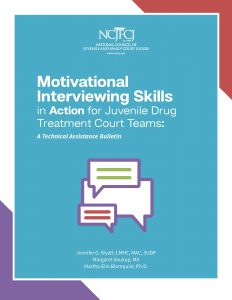 Motivational Interviewing (MI) is an evidence-based practice recommended for use in juvenile drug treatment court (JDTC) settings (OJJDP, 2016). Specifically written with JDTC team members in mind, this technical assistance bulletin (TAB) on MI skills is intended to (a) illustrate the spirit, skills, and strategies of MI; (b) encourage the interest of team members in building proficiency in MI; and (c) guide team members in applying MI skills learned in training to the JDTC context.
Motivational Interviewing (MI) is an evidence-based practice recommended for use in juvenile drug treatment court (JDTC) settings (OJJDP, 2016). Specifically written with JDTC team members in mind, this technical assistance bulletin (TAB) on MI skills is intended to (a) illustrate the spirit, skills, and strategies of MI; (b) encourage the interest of team members in building proficiency in MI; and (c) guide team members in applying MI skills learned in training to the JDTC context.
People of all educational levels and backgrounds can learn and use the spirit, skills, and strategies associated with MI (Miller & Rollnick, 2013). Most practitioners successfully develop skills with guided practice; that is, after learning the basic concepts, the person receives coaching and feedback as their practice is observed (Miller & Rollnick, 2013; Rosengren, 2018). Learning MI is similar to playing a musical instrument or a sport. Musicians and athletes improve with observed practice and feedback from coaches to shape their skill development. Beginning with an understanding of the theory and practice, JDTC team members may develop proficiency in the spirit, skills, and strategies through training, observed practice, and coaching.
Specific communication skills to guide youth toward change are illustrated through concrete examples and an effective method for sharing information is described. Core skills, known as the OARS, and strategic methods for cultivating change talk and softening sustain talk are presented. Sample dialogue using common scenarios encountered in JDTC settings demonstrates how the skills and strategies work together to motivate adolescents toward change.
This TAB functions as a reference for applying MI skills and strategies within the context of JDTC work. Throughout the TAB, action tips suggest specific ways in which the JDTC team members may implement the skills and strategies right away. Similarly, the companion set of MI Info Card and Cue Cards serve as visual prompts and reminders for use in court, staffing, and in meetings with youth and their families. The Info Card covers MI in a Nutshell, Definition, Spirit, Four Processes, Core Skills, and Change Talk. Six cue cards make up the MI Cue Card Set and cover OARS in Action, Affirmations, Strategies for Cultivating Change Talk, Strategies for Softening Sustain Talk, Elicit – Provide – Elicit (EPE), and Rethinking Resistance & Dodging Discord.